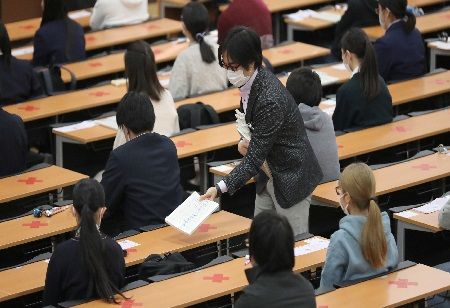- Japan prepares to admit US-rejected students, with 90 universities ready to fast-track admissions, scholarships, and support amid Trump-era visa denials.
- Language remains Japan’s Achilles’ heel, says strategist Kenichi Ohmae, as top students avoid Japan due to lack of English instruction and steep Japanese learning curve.
- Tohoku University to invest ¥30 billion to attract 500 top researchers, but experts warn funding alone won’t help without major English-language policy reforms.
The government of President Donald Trump has been pummeling the granting of student visas to American institutions of higher learning. It has been specially interested in denying entry to pro-Palestinian individuals or persons who practice antisemitism. Further, individuals with connections to the Chinese communist party have also become the focus of more stringent checks.
In an article in Shukan Post (Aug 8), business strategist Kenichi Ohmae notes that top national universities of Japan, such as the University of Tokyo, Kyoto University, Osaka University and so on, have made preliminary arrangements for admitting such students on a temporary basis.
As of June 5, about 90 universities in Japan have agreed to speed up the admission of the students as well as provide them with scholarships and other assistance, says the Ministry of Education.
Foreign students were polled and, as of May 1, 2024, Japan was found to have 336,708 foreign students, an increase of 57,434 compared to last year. By nationality, China topped the chart with 123,458 students, followed by Nepal (64,816), and Vietnam (40,323). Increasing numbers of students have also been arriving from other countries in Asia, such as Myanmar, Sri Lanka, Bangladesh, Indonesia, Mongolia and others.
Still among those figures not many could be considered 'outstanding students'. "There are several reasons for this but the biggest obstacle to enrolling in Japanese universities is that they don't teach in English, the international language. And learning the Japanese language is very hard for foreigners", writes Ohmae
If the University of Tokyo is to enrol students from the U.S., Ohmae does not believe that top-rank students and researchers (with the exception of Japanese citizens) will accept Japan's offer to come study here. "Many of the students whom Trump has pushed out of America are likely to migrate to other English-speaking nations like the UK, Australia and Canada, other alternatives will be universities in the European Union, Singapore, Hong Kong and elsewhere", he adds.
Singapore is a tiny nation with a high quality of life, but living expenses there are a high barrier. Hong Kong, however, has evolved into a 'control society' that is China-dominated with tighter controls over freedom in academia, deterring applicants.
In short, Japan's biggest weakness is its communications capacity. "When I was part of a merger negotiation involving an Indian software company, I was informed by many Indian technical professionals, 'Sorry, but I do not wish to go to work in Japan', citing the reason as the unfavorable English atmosphere and steep Japanese language hurdle", Ohmae narrates.
Also Read: Asia-Pacific Online Language Learning Market to be Worth $22.5 Billion by 2030
The language issue also operates in the opposite direction. In a recent Japan Tourism Agency survey of 400 Japanese male and female members of Gen Z, the 19-to-25 year age cohort, close to 60% of those surveyed told them they had no interest in traveling overseas. One of the reasons cited for not being interested was their lack of English language ability. In the opinion of Ohmae, until we go so far as to 'teach in English' and not merely 'teaching English' no remedy for Japanese folk's sophisticated obsession with English shall ensue.
But money is not an issue. The government has provided sufficient funds to rectify the situation. With an ambition to be an 'excellent internationalized research university', Tohoku University made a declaration that it will invest 30 billion yen in increasing the number of researchers over the next five years, with an intention to recruit 500 high-remunerated researchers.
But it's not a question of funding, according to Ohmae. Unless the proper climate for English is established, Japan won't attract top-quality human resources.
If Japan does not shift its policy with regard to English and regard familiarity of English as a natural part of schooling perhaps by emulation of Malaysia, where from primary school to university Japanese would be the instruction language in the humanities, and English the instruction language in mathematics and science even the effort to invite excellent human resources will be in vain.

